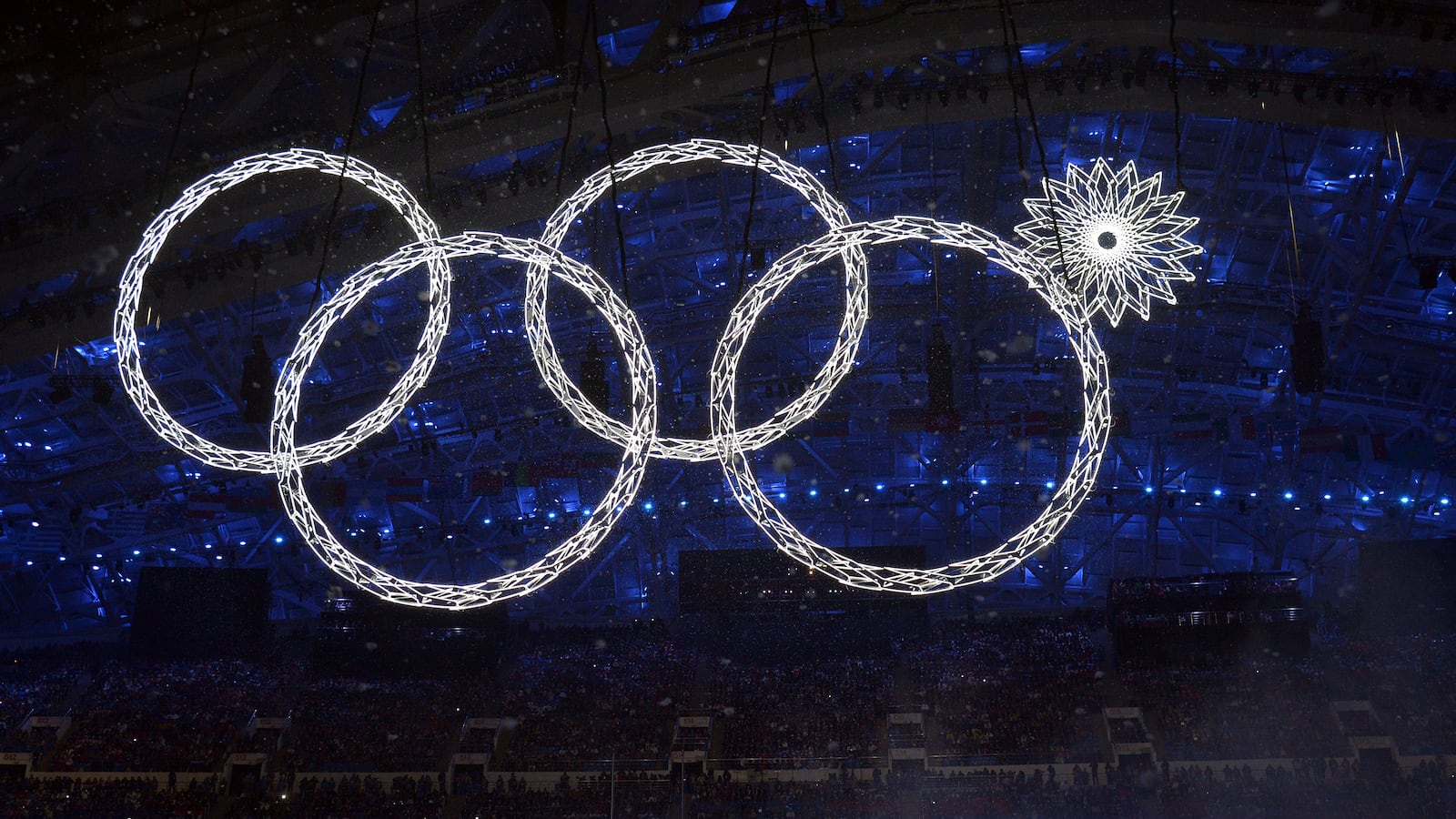Missed the opening ceremonies? Then I know what you’re wondering: Did they put the part where a woman publicly confirmed Woody Allen molested her at age 7 before or after Azerbaijan? #confused
Those of you who tuned in to the festivity in Sochi likely still have a few questions that remained unanswered. Such as: hold on, there’s a “Cyrillic” alphabet? Isn’t it just a spy game artifact of the Cold War that has yet to be decrypted? What’s a Russian “hipster”? And there were enough of them in Soviet times that they merited their own shout-out? Were the dances truly designed by the choreographer for Broadway’s Spiderman: Turn Off the Dark? Then why did no one break a rib?
I’m happy to provide some answers: Da; nyet; someone who drives a Lada ironically; apparently so; crazy, right?; I have no clue.
Even had you seen the unabridged ceremony, if you blinked you may have missed a few only-at-the-Olympics geopolitical idiosyncrasies that, if you really stretch for it, open a window onto the world. Huge global conflicts, writ small — that is, if a billion-dollar Soviextravaganza can be considered small — that escaped your attention.
For example, you didn’t overhear this hypothetical conversation in the staging area between athletes from Israel and Iran who — thanks to that mythical “Cyrillic” alphabet you’ve now heard so much about — marched back to back.
Israeli athlete: You will never be allowed to have a nuclear weapon.
Iranian athlete: You don’t exist.
Israeli athlete: Then who are you talking to?
Iranian athlete: [closing eyes, covering ears] I can’t hear you.
Nor were you aware that the country of India arrived in Sochi under a brand new name: “Independent Athletes.” Its three competitors — two skiers and a luger — were stripped of their national identity as punishment for “ethical” failures by their county’s Olympic organization. Personally, I’m not surprised the Indian Olympic Committee is corrupt, I’m just surprised the notoriously corrupt IOC looked up from its own history of corruption long enough to notice India’s corruption. Hard to say if the banishment will make any impact on the outcome on the medal stand. The Indian athletes are a long shot for even a bronze, while the International Olympic Committee long ago won the gold for hypocrisy.
Had they marched under “India,” they wouldn’t have been too far head in the parade to notice, as “J” came next, what you did not. The Jamaican Bobsled team is back, having already won about twenty-three golds in Kickstarting.
You didn’t hear this, either: Twelve tropical countries have sent athletes to Sochi. That’s five more than in 2010, and the most ever for any Winter Games. Supposedly the hot invasion is due to two factors: one, more athletes with dual citizenship are overcoming any embarrassment they may have had to go with the country that needs them more desperately; and two, a concerted effort by the IOC to reach out to snow-deprived countries. But I blame global warming. Somehow.
You also failed to notice that despite its familiarity with snow and altitude, the country of Nepal, which boasts the highest point on Earth, has tied for the lowest representation among those that have sent athletes to Sochi. The pride of Kathmandu is a cross-country skier named — I kid you not — Sherpa. Dacchiri Sherpa. His humility is refreshing; Sherpa himself expects a last-place finish. But if anyone needs help getting back up the mountain, he’s your man.
In one sense, Nepal isn’t alone. Of the eighty-eight countries competing in Sochi, a whopping eighteen have sent only one athlete. A freestyle skier from Paraguay. A short-track speed skater from Hong Kong. A luger from Tonga. And my odds-off favorite, an alpine skier from the Central Asian country of Kyrgyzstan, where—full disclosure—I spent a few months last year. Their lone competitor is also appropriately named: Dmitry Trelevski. He may not have brought home any hardware last time around — he failed to medal in Vancouver — but don’t you dare count him out. The Kyrgyz government certainly doesn’t. Last week, it earmarked some serious som (Kyrgyz currency, that is) to help Telesvski on his Olympic journey: 100,000, or the equivalent of $1,980 US dollars. With that kind of dough, he could almost buy a ticket to watch the Jamaican Bobsled team.
Had you blinked, you may not have known any of this. But these were just the prelims; there’s time to catch up. So as you watch the competition over the next two weeks, pay attention and don’t be afraid to root for the underdog—he or she may be feeling a little lonely. And send me any questions you may have about the proceedings. I’ll be happy to invent some answers.





